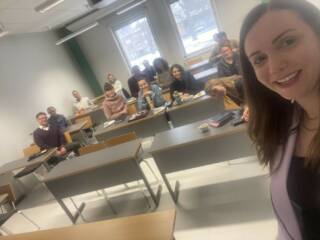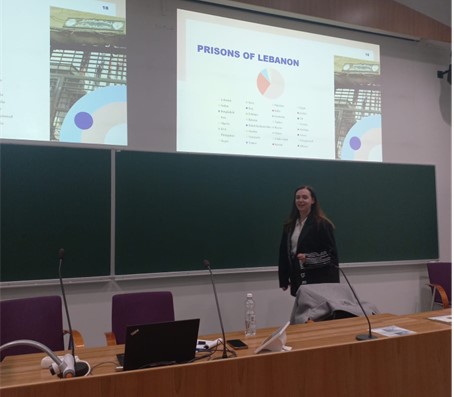On 23.-24.4.2024 Space and Political Agency Research Group (SPARG) hosted a research visit from Yasmine Fakhry from the University of East London. During her visit Fakhry gave a presentation as part of the SPARG seminar series and a guest lecture on the MAB Decentering the Global (HAL.YPAT.341-2023-2024). In addition to the formal presentations, Fakhry’s visit offered numerous opportunities for informal networking, connecting through shared interests over regional theoretical debates and spatial explorations of post-fool’s spring Tampere.
Fakhry’s doctoral research focuses on health and nutrition in Lebanese prisons, and it regards these issues from a human’s rights and social justice point of view. She has conducted analyses of prison menus, interviews and questionnaires with key personnel in the ministry of interior and municipalities and prisons’ officers as well as collected 291 questionnaires from prisoners regarding their health and nutrition during incarceration. In her thesis Fakhry argues, that right to health is the most important right to achieve. She considers prisons as prisms in understanding greater societal debates on rights, sustainable health outcomes and human development on the level of the society on a micro level and on the level of the nation on a macro level.

Fakhry’s visit began with a presentation in the SPARG seminar series. Here she focused on the questions of spatiality inside prisons, and how issues of overcrowding and the impact of ongoing financial crisis and conflict impact access to medicine and health for prisoners. Her talk highlighted the intersectionality of conflict, migration and economic inequalities, as prisoners rely on family and NGOs for basic medication and medical assistance. A lively discussion of her research methods followed. Fakhry demonstrated that the sensitive ethical questions in prison research, especially in the context of crisis and lack of democratic rights, was outweighed by the participants’ strong desire to be heard regarding their health and nutrition access. Research such as Fakhry’s, while difficult to navigate ethically, has the potential to create democratising and empowering feedback channels that allow prisoners to communicate their needs.
Fakhry’s lecture in the Decentering the Global course was able to provide a more detailed glimpse of the social and political context of Lebanon, from Ottoman rule, the French Protectorate, decades of armed conflict and hostility from Israel to the economic crisis, which the Beirut explosion brought into global public consciousness. Lebanon hosts a high number of refugees from many of its neighbouring countries, mainly Palestine and Syria. Looking at prisons within this context helps reveal how larger questions of social and economic sustainability are entangled inside the prison walls. Fakhry presented compelling citations from prisoners and images from inside prisons to demonstrate the urgency of prison reform. She also discussed the challenges to such a reform, and indeed a for a greater political reform needed to move Lebanon towards a society that is able to sustain the conditions for dignified life for all. The greatest issues inside prisons are overcrowding, lack of privacy during medical examinations and in medical records, lack of access to medical supplies and the long wait – sometimes many years – that prisoners face before even reaching trial. Some positives emerged also: overall the prison services aim to meet the Nelson Mandela Rule on health and nutrition. The greatest societal challenges to reform stem from confessional political climate which prevents meaningful political reform as well as complete lack of services for rehabilitating prisoners after their release. The lecture was followed by a lively discussion, where students pondered about the possibilities of decarceration, political divisions inside prisons, the effect of current Israeli genocide of Palestinians and bombing of Lebanese border and more.

Lunch with the Space and Political Agency Research Group members.
Fakhry will be defending her PhD, supervised by Aura Lounasmaa, at the University of East London in the autumn of 2024.
Text by Aura Lounasmaa. Photos by Yasmine Fakhry and Aura Lounasmaa.


